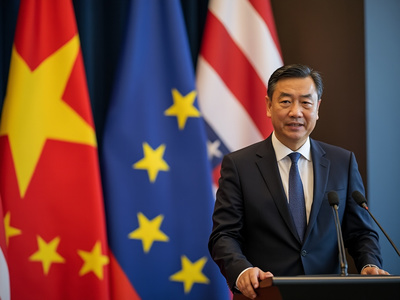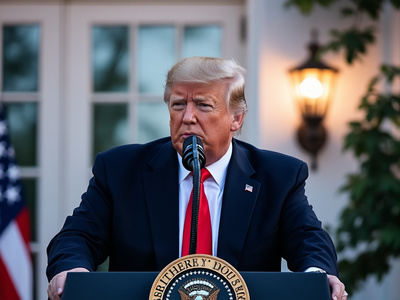
EU Proposes Zero Tariffs on Industrial Goods to US Amid Trade Tensions
Ursula von der Leyen offers a proposal to reduce tariffs to zero amidst ongoing trade disputes and economic concerns.
On April 7, 2025, Ursula von der Leyen, president of the European Commission, proposed a plan to the President of the United States, Donald Trump, aimed at reducing tariffs on all industrial products to zero, with a specific emphasis on automobiles.
This offer comes during a period of significant global financial volatility and in the context of escalating trade tensions between the EU and the US.
Von der Leyen affirmed her readiness to activate "all instruments" at her disposal against the United States should negotiations fail to yield results.
The US is currently imposing a 25% tariff on steel, aluminum, and automobiles, alongside a flat 20% tariff on other European goods.
In response, Brussels is contemplating the enactment of its new trade regulation framework aimed at mitigating the economic impact of the tariffs, which would enable the imposition of restrictions on US services trade, potentially impacting major technology firms, as well as property rights related to commerce.
She emphasized that the tariffs imposed by the US result in substantial costs for American consumers and businesses, while also having significant ramifications for the global economy, particularly affecting developing nations.
Von der Leyen stated, "This represents a huge turning point for the United States."
The European Commission had previously proposed a zero-tariff agreement regarding automobiles, wherein the EU currently charges a 10% tariff as opposed to the US's 2.5%.
This proposal was rejected by Trump, who opted instead to increase tariffs to 25%.
In a proactive stance, von der Leyen reassured that the EU is prepared to implement countermeasures to safeguard its economic interests, including establishing an Import Monitoring Task Force to prevent economies like China from offloading products in Europe that cannot be sold in the US market.
During the same period, Elon Musk, a prominent tech entrepreneur and advisor previously close to Trump, suggested a free trade agreement between the EU and the US that would facilitate the reduction of tariffs to zero on both sides of the Atlantic.
Musk expressed the view that such a move would help both Europe and the United States build a free trade zone.
Contrarily, Peter Navarro, an economic advisor to Trump, dismissed Musk's proposition, suggesting that it might be motivated by Tesla's financial struggles, stating, "Elon sells cars.
He is simply protecting his own interests."
Von der Leyen has been engaging with representatives from both the steel and aluminum industries and is set to continue consultations with the automotive and pharmaceutical sectors, stating that these discussions are critical for crafting an effective EU response, ensuring that the interests of these industries are well-protected.
This offer comes during a period of significant global financial volatility and in the context of escalating trade tensions between the EU and the US.
Von der Leyen affirmed her readiness to activate "all instruments" at her disposal against the United States should negotiations fail to yield results.
The US is currently imposing a 25% tariff on steel, aluminum, and automobiles, alongside a flat 20% tariff on other European goods.
In response, Brussels is contemplating the enactment of its new trade regulation framework aimed at mitigating the economic impact of the tariffs, which would enable the imposition of restrictions on US services trade, potentially impacting major technology firms, as well as property rights related to commerce.
She emphasized that the tariffs imposed by the US result in substantial costs for American consumers and businesses, while also having significant ramifications for the global economy, particularly affecting developing nations.
Von der Leyen stated, "This represents a huge turning point for the United States."
The European Commission had previously proposed a zero-tariff agreement regarding automobiles, wherein the EU currently charges a 10% tariff as opposed to the US's 2.5%.
This proposal was rejected by Trump, who opted instead to increase tariffs to 25%.
In a proactive stance, von der Leyen reassured that the EU is prepared to implement countermeasures to safeguard its economic interests, including establishing an Import Monitoring Task Force to prevent economies like China from offloading products in Europe that cannot be sold in the US market.
During the same period, Elon Musk, a prominent tech entrepreneur and advisor previously close to Trump, suggested a free trade agreement between the EU and the US that would facilitate the reduction of tariffs to zero on both sides of the Atlantic.
Musk expressed the view that such a move would help both Europe and the United States build a free trade zone.
Contrarily, Peter Navarro, an economic advisor to Trump, dismissed Musk's proposition, suggesting that it might be motivated by Tesla's financial struggles, stating, "Elon sells cars.
He is simply protecting his own interests."
Von der Leyen has been engaging with representatives from both the steel and aluminum industries and is set to continue consultations with the automotive and pharmaceutical sectors, stating that these discussions are critical for crafting an effective EU response, ensuring that the interests of these industries are well-protected.
Translation:
Translated by AI
AI Disclaimer: An advanced artificial intelligence (AI) system generated the content of this page on its own. This innovative technology conducts extensive research from a variety of reliable sources, performs rigorous fact-checking and verification, cleans up and balances biased or manipulated content, and presents a minimal factual summary that is just enough yet essential for you to function as an informed and educated citizen. Please keep in mind, however, that this system is an evolving technology, and as a result, the article may contain accidental inaccuracies or errors. We urge you to help us improve our site by reporting any inaccuracies you find using the "Contact Us" link at the bottom of this page. Your helpful feedback helps us improve our system and deliver more precise content. When you find an article of interest here, please look for the full and extensive coverage of this topic in traditional news sources, as they are written by professional journalists that we try to support, not replace. We appreciate your understanding and assistance.











